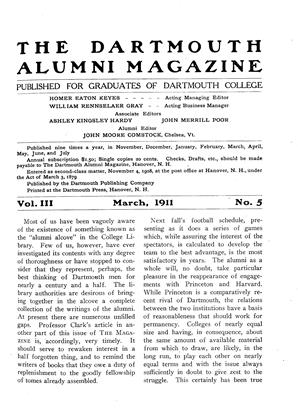President Nichols showed his confidence in the student body and his recognition of the propriety of letting the future alumni known what is going on when he appeared at the smoke talk of Saturday evening, February 18, and occupied the evening with a frank ana informal formal discussion of College problems.
He spoke first of the financial needs of Dartmouth, showed that it costs somewhat more than twice as much to give each student instruction as is paid for tuition, and pointed to the need for funds not only to meet current expenses, but to make adequate increase m the College plant in the way of a new recitation building, new laboratories for chemistry and biology, and a new library the old building which was sufficient for a college of 350 being insufficient for a college of 1200.
One of the elements of the increased cost to the College of giving an education he showed to be the latitude allowed by the elective system, which has spread a table of great variety and almost disproportionate expense m the presence of the undergraduate. Under the Rood old-fashioned system of strict requirement and few options, five years would have sufficed the enterprising student for taking a try at all the College had to offer. Under present conditions, he of the eclectic mind would need twenty-eight years, putting summer school out of account, to consume all of the feast of reason which is presented. Such an arrangement, of necessity. means increased cost of plant and increased cost of specialized instruction In this connection the President deplored the unavoidable bewilderment which the student must experience in the face of the variety of choice, and gave promise of some kind of expert guidance for those seeking to point a definite course through the mazes of the curriculum.
In the matter of scholarship, he reminded his hearers that the non-academic world has, for some time, been criticising the colleges for allowing the students to place too much emphasis on the social aspects of their life and too little emphasis upon its intellectual aspects. With no desire to minimize the benefit and attractiveness of these social aspects, the President pointed out that the College must make sure that its students are gaining in power through actual mental exercise in wrestling with their courses, rather than gaming m agility through efforts to dodge them. The accuracy of the man who succeeds in unfailingly hitting between M and 55 for a mark is of such a quality that he should be encouraged to aim a few pegs higher. Hence it may soon come to pass that a man will be required to gain a mark of at least 60 in one course out of three. In view of the latitude of elections, this does not seem an extravagant requirement.
In concluding his remarks, the President spoke of the democracy of the College. The essence of democracy, he maintained, lies in the possibility of sympathetic understanding among' . all the men of the College. The difficulty of ensuring this increases with the growth of. the institution, yet it is not impossible if cleavage in various directions is prevented by keeping the student body constantly and rather vigorously stirred. As means to this end he spoke of the emphasis upon the dormitory life of the College, where provision is made against segregation of cesses or segregation of groups that might become united by ties of similar pocket money: he pointed out the healthy arangement in regard to fraternity houses where less than fifty per cent of a chapter may abide together and where the elsewhere common custom of eating in fraternal seclusion is unknown. With fifty per cent of the students earning some part of their way through College; with the majority coming from the essentially democratic influences of the public schools, and with the student body as a whole representing a wide geographical distribution and hence a considerable variety of opinion and ideas, he expressed himself as satisfied that the democracy of Dartmouth is in no danger of extinction.
President Nichols' audience, which filled the Commons dining room, listened to him with the closest attention; and, when the talk was over, departed to discuss not only the substance of the evening's discourse, but the sound and farreaching knowledge and understanding of things Dartmouth which it implied.
F. L. Harris in the Ski Jump
DARTMOUTH'S WINTER CARNIVAL
 View Full Issue
View Full Issue
More From This Issue
-
 Article
ArticleTHE ALUMNI ALCOVE IN THE COLLEGE LIBRARY
March 1911 By Eugene Francis Clark '01 -
 Article
ArticleMost of us have been vaguely aware of the existence of something known as the "alumni alcove" in the College Library.
March 1911 -
 Article
ArticleDR. NATHAN SMITH'S LECTURE ON CHEMISTRY
March 1911 By Edwin J. Bartlett -
 Class Notes
Class NotesLOCAL ASSOCIATIONS
March 1911 -
 Article
ArticleConcerning the Agora
March 1911 -
 Class Notes
Class NotesCLASS SECRETARIES
March 1911
Article
More From This Issue
-
 Article
ArticleTHE ALUMNI ALCOVE IN THE COLLEGE LIBRARY
March 1911 By Eugene Francis Clark '01 -
 Article
ArticleMost of us have been vaguely aware of the existence of something known as the "alumni alcove" in the College Library.
March 1911 -
 Article
ArticleDR. NATHAN SMITH'S LECTURE ON CHEMISTRY
March 1911 By Edwin J. Bartlett









